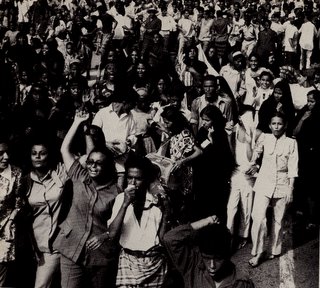

Packing my books the other day I came across Fred Halliday's Arabia without Sultans, a Marxist analysis of the Arabian Peninsula and Iran written in 1975 and reprinted in 2002. As Fred Halliday now says of this book:
Arabia partook...of the tone and language of the revolutionary left of this epoch: in this sense it is a document of its time. It did, on a number of issues, notably nationalism and "underdevelopment," seek to distance itself from prevailing views on the left. For example, in regard to the Gulf it took issue with the Arab nationalist categorization of Persian immigrants as agents of the Shah's expansionism, while on the Arab-Israeli question it argued, against most current opinion, for a two state solution. On underdevelopment, it sought, under the influence of the writings of Bill Warren and others, to argue for the possibilities of economic and political development under capitalism, rather than, as the dependency school of Andre Gunder Frank and Samir Amin did, assert that no such development was possible. It nonetheless was part of the Marxist perspective of the late 1960s and early 1970s. It reflects some of the rhetorical delusion of that outlook, above all an uncritical attitude to armed struggle in general
These are two pictures from the original book, a demonstration by the women's union in South Yemen and female soldiers of the Popular Front for the Liberation of the Occupied Arabian Gulf, where are these women now? No one would now defend blindly their politics, but what we have seen is not an advance but a capitulation. Halliday in his reconsideration of the book:
Precisely because of the prevalence of Islamist thinking, its use by ruling elites, and its compatibility with economic development, "it is essential," the text continued, "to supersede Islam with materialist thought." I would argue that the events of the past 25 years have underscored its validity: Islamist ideologies have indeed been able to flourish alongside economic development, but they have equally served to confuse, divide and divert the peoples of this region. This has been the case with the obscurantist and authoritarian variant of Saudi Arabia, copied to varying degrees by other Gulf regimes, as well as with the demagogic and self-defeating rhetoric of the Islamic Republic of Iran.



0 Comments:
Post a Comment
<< Home